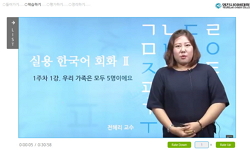This study presents the effect of computer-mediated communication on realizing politeness strategies, based on the corpus of Korean business correspondence. The data is comprised of 62 e-mail messages collected from two Korean companies. The data anal...
http://chineseinput.net/에서 pinyin(병음)방식으로 중국어를 변환할 수 있습니다.
변환된 중국어를 복사하여 사용하시면 됩니다.
- 中文 을 입력하시려면 zhongwen을 입력하시고 space를누르시면됩니다.
- 北京 을 입력하시려면 beijing을 입력하시고 space를 누르시면 됩니다.
https://www.riss.kr/link?id=A101824808
- 저자
- 발행기관
- 학술지명
- 권호사항
-
발행연도
2002
-
작성언어
English
- 주제어
-
등재정보
KCI등재후보
-
자료형태
학술저널
- 발행기관 URL
-
수록면
197-210(14쪽)
-
KCI 피인용횟수
1
- 제공처
-
0
상세조회 -
0
다운로드
부가정보
다국어 초록 (Multilingual Abstract)
This study presents the effect of computer-mediated communication on realizing politeness strategies, based on the corpus of Korean business correspondence. The data is comprised of 62 e-mail messages collected from two Korean companies. The data analyses demonstrate that frequent use of in-group language (positive politeness) supports the claim that shared knowledge has been established between interactants (e.g. English code) and prosodic features are found in e-mail messages (e.g. slang), Besides positive politeness strategies, negative politeness strategies (which are main properties of written communication) are also found in e-mail messages (e.g. nominalization: passivization). In conclusion, the basic argument I present is that e-mail texts for Korean business communication have linguistic features of spoken and written communications in the use of politeness strategies.
동일학술지(권/호) 다른 논문
-
- 언어과학회
- 김형덕(Hyung Duk Kim)
- 2002
- KCI등재후보
-
- 언어과학회
- 김홍자(Hong Ja Kim)
- 2002
- KCI등재후보
-
- 언어과학회
- 서정목(Jeong Mok Seo)
- 2002
- KCI등재후보
-
Axiological Aspects of Some Image Schemata Revealed in the New International Version of the Bible
- 언어과학회
- Hee Soo Yoon(윤희수)
- 2002
- KCI등재후보
분석정보
인용정보 인용지수 설명보기
학술지 이력
| 연월일 | 이력구분 | 이력상세 | 등재구분 |
|---|---|---|---|
| 2026 | 평가예정 | 재인증평가 신청대상 (재인증) | |
| 2020-01-01 | 평가 | 등재학술지 유지 (재인증) |  |
| 2017-01-01 | 평가 | 등재학술지 유지 (계속평가) |  |
| 2013-01-01 | 평가 | 등재학술지 유지 (등재유지) |  |
| 2010-01-01 | 평가 | 등재학술지 유지 (등재유지) |  |
| 2008-01-01 | 평가 | 등재학술지 유지 (등재유지) |  |
| 2006-04-24 | 학회명변경 | 영문명 : 미등록 -> The Linguistic Science Society |  |
| 2005-01-01 | 평가 | 등재학술지 선정 (등재후보2차) |  |
| 2004-01-01 | 평가 | 등재후보 1차 PASS (등재후보1차) |  |
| 2002-07-01 | 평가 | 등재후보학술지 선정 (신규평가) |  |
학술지 인용정보
| 기준연도 | WOS-KCI 통합IF(2년) | KCIF(2년) | KCIF(3년) |
|---|---|---|---|
| 2016 | 0.35 | 0.35 | 0.34 |
| KCIF(4년) | KCIF(5년) | 중심성지수(3년) | 즉시성지수 |
| 0.34 | 0.35 | 0.608 | 0.09 |





 KCI
KCI DBpia
DBpia






